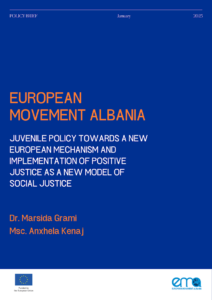Policy Brief – Juvenile Policy towards a New European Mechanism and Implementation of Positive Justice as a new Model of Social Justice, January 2025
 This policy document written by Dr. Marsida Grami and Msc. Anxhela Kenaj, explains and demonstrates the reformation of the juvenile justice system in Albania, as it approximates the 2021 EU Directive of Juvenile Policy and the EU Strategy on Children’s Rights 2022-2027. The focus of this paper is to first give an overview of the current laws on Criminal Justice for Children Code and the Law on the Rights and Protection of Children and the legal framework in Albania. To explain the notion of these reforms, the authors delve into the socio-economic and psychological aspect of minors committing crimes, meaning they are influenced by their environment, and are often marginalised and underprivileged groups/conditions. These insights are important , when understanding the reasons and patterns that lead to minor’s interaction with the law and how to take effective preventative matters. Especially, the acts of preventive measures and regulations, to protect children as is mandatory under the Human Rights Act. Thereafter, it dives deeper into the changes of a retributive system into a restorative justice system, seeking to give statistics and evidence of the effectiveness of this new and inclusive model. The focus remains on reintegrating and changing the narrative of isolating the crime, into looking at it from a broader understanding and putting the hurts of the victim in the forefront. This way, if both are consenting, the victim and perpetrator can have a dialogue under the supervision of an impartial third party, known as the facilitator. The approach of direct communication allows for honest, transparent and therapeutic treatment, while giving the victim agency to express their pain, and the perpetrator to see their fault, and therefore through empathy prevent another instance of crime.
This policy document written by Dr. Marsida Grami and Msc. Anxhela Kenaj, explains and demonstrates the reformation of the juvenile justice system in Albania, as it approximates the 2021 EU Directive of Juvenile Policy and the EU Strategy on Children’s Rights 2022-2027. The focus of this paper is to first give an overview of the current laws on Criminal Justice for Children Code and the Law on the Rights and Protection of Children and the legal framework in Albania. To explain the notion of these reforms, the authors delve into the socio-economic and psychological aspect of minors committing crimes, meaning they are influenced by their environment, and are often marginalised and underprivileged groups/conditions. These insights are important , when understanding the reasons and patterns that lead to minor’s interaction with the law and how to take effective preventative matters. Especially, the acts of preventive measures and regulations, to protect children as is mandatory under the Human Rights Act. Thereafter, it dives deeper into the changes of a retributive system into a restorative justice system, seeking to give statistics and evidence of the effectiveness of this new and inclusive model. The focus remains on reintegrating and changing the narrative of isolating the crime, into looking at it from a broader understanding and putting the hurts of the victim in the forefront. This way, if both are consenting, the victim and perpetrator can have a dialogue under the supervision of an impartial third party, known as the facilitator. The approach of direct communication allows for honest, transparent and therapeutic treatment, while giving the victim agency to express their pain, and the perpetrator to see their fault, and therefore through empathy prevent another instance of crime.
This material was produced within the project “Building Partnership on Fundamentals: Empowering CSOs for the EU accession process”, with the financial support of the European Union. Its content is the sole responsibility of the European Movement in Albania and the authors, and does not necessarily reflect the views and positions of the European Union.
The project “Building Partnership on Fundamentals: Empowered CSOs in the EU accession process” is being implemented by the European Movement in Albania (EMA), with the financial support of the European Union – IPA Civil Society Facility 2021, in cooperation with the Academy of European Integration and Negotiations (AIEN), Slovak Foreign Policy Association (SFPA) and the Center for Transparency and Freedom of Information (CTFI).





